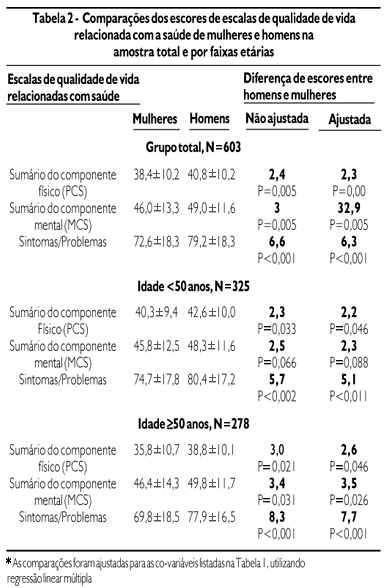OBJECTIVE: To compare men and women on chronic hemodialysis in relation to their scores in health-related quality of life (HRQOL) and evaluate the potential influence of age and comorbidities on the comparison. METHODS: Cross-section of the baseline data of 254 women and 349 men, participants of the PROHEMO Study that has been developed in dialysis units of Salvador. By using the version of the Kidney Disease Quality of Life Short Form KDQOL-SF, validated for the Brazilian population, the following scores were determined: physical component summary (PCS), mental component summary [MCS] and the scale for symptoms/problems related to renal disease. The PCS and MCS scores were derived from the eight generic KDQOL-SF scales. Multiple linear regression was used to estimate differences in the scores of men and women (DS), adjusted for age, years on hemodialysis, heart failure, cerebrovascular disease, peripheral vasculopathy, diabetes, serum hemoglobin and serum albumin. RESULTS: Mean ages were 48.1±14.1 and 49.4±14.0 years for women and men, respectively. Women had lower scores for all generic HRQOL scales. They also had significantly (P<0.001) lower scores for PCS (DS = 2.4 points), MCS (DS = 3 points) and symptoms/problems (DS = 6.6 points). Differences were independent of comorbidties and greater in the group over 49 years of age. CONCLUSION: Data indicate that for several scales of HRQOL, women treated chronically by hemodialysis had lower scores than men. Lower scores in women were observed for different age groups, independently of comorbidities.
Quality of fife; Gender and health; Age groups; Hemodialysis; Chronic kidney disease


